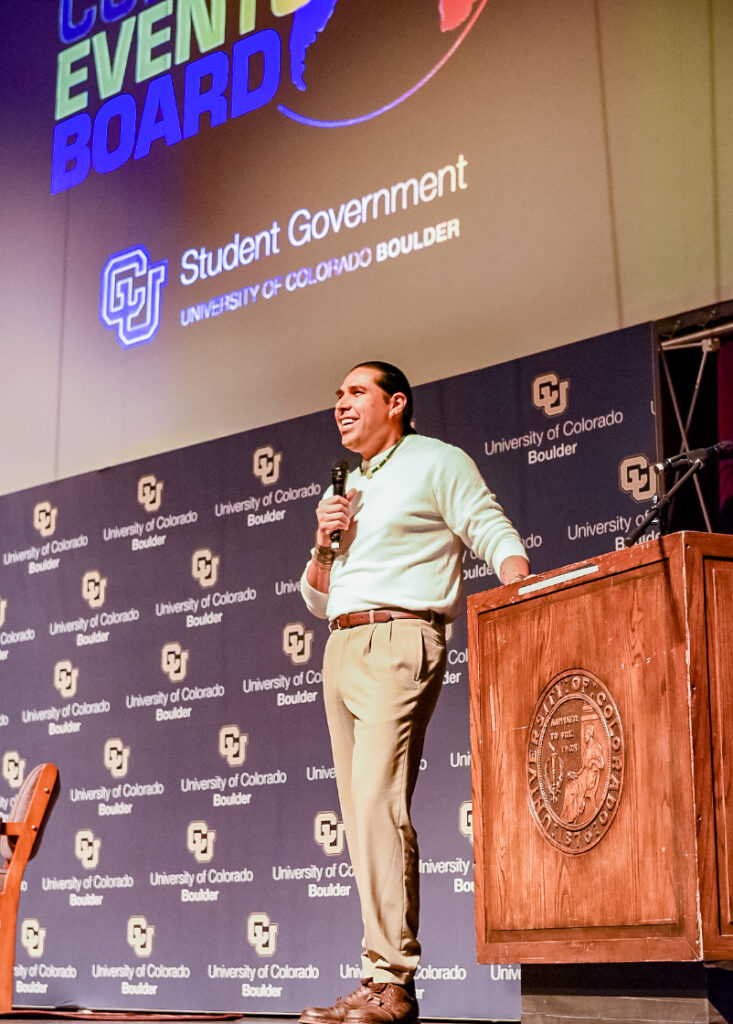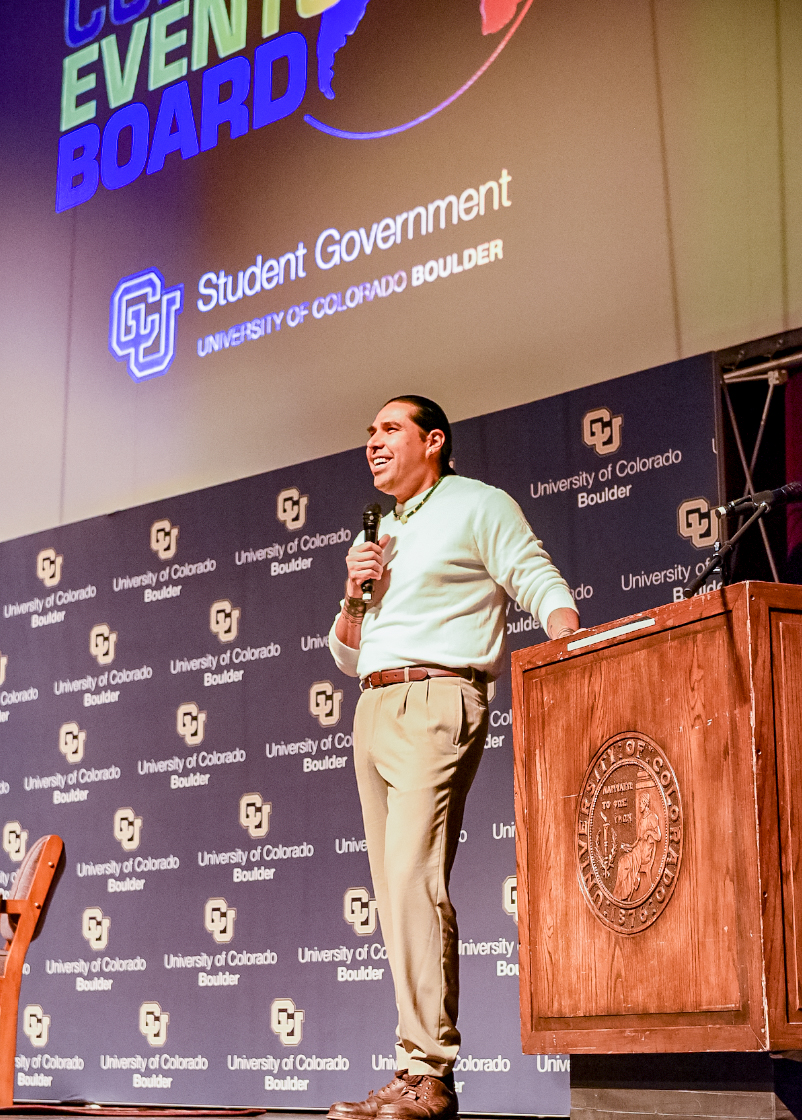By Bell Piccirillo
If you’ve ever wondered how to balance cracking jokes while attempting to save Mother Earth, Dallas Goldtooth is your guide. Known mostly for his role in the groundbreaking comedy sketch series “Reservation Dogs,” a show with an all-Indigenous cast and crew that navigates the space between storytelling and activism, Goldtooth masterfully blends humor with heavy topics. Whether on-screen or through his relentless environmental activism, he leaves his audience laughing, thinking, and better prepared to tackle environmental justice.

Speaking at CU Boulder’s Macky Auditorium on the night of Tuesday, Sept. 24, Goldtooth showcased his unique blend of comedy and activism. The Cultural Events Board (CEB), who originally reached out to Goldtooth, recognized his ability to merge these worlds.
“We felt that part of [the decision for our speaker] was that in every class, every syllabus, every presentation, there’s always this land acknowledgement, but they just read it and move on. And while, yes, that is important, it feels very performative,” Shoshana “Soshi” Greenblum, CEB’s Assistant Speakers Coordinator said. “We wanted to make sure we are not just saying a land acknowledgement but also bringing speakers to the university that are from indigenous groups and can highlight their experiences and culture.”
Goldtooth, a member of the Oceti Sakowin Nation, is far from your stereotypical activist. His style consists more of tackling serious topics like climate change and Indigenous rights all while simultaneously keeping the crowd laughing. Within the Q&A portion of the talk, Goldtooth’s stories from his writer days on “Reservation Dogs” range from “prayer battles” between uncles to exaggerated youth conferences mocking the perception of activists as overtly serious. Even when addressing the heavy toll environmental injustice takes on marginalized communities, Goldtooth uses humor to make the conversation more accessible in spaces that may be contentious. When asked about balancing politics and comedy, Goldtooth said he didn’t initially set out to turn activism into a punchline, but humor often helps folks connect.
During the Q&A, Goldtooth shared insights on his work in “Reservation Dogs.” and how the show’s storytelling mirrors his approach to activism.
“At the core, we wanted to tell a story about these kids,” Goldtooth said, emphasizing that the show aims to weave its messages into skits and scenes rather than outright telling the audience. He likened this approach to his activism, particularly his work fighting the April 2016 Dakota Access Pipeline. The simple yet powerful message, “Water is life” (“Mni wičoni”), became the core of that movement, reiterating Goldtooth’s message of storytelling within activism. Goldtooth recounted how the messaging helped mobilize support for the pipeline protests while fondly remembering Phillis Young, who was the spokesperson of the fight and faced violence such as army tanks and rifles while battling injustice. Her bravery and resilience were pivotal in advancing the cause.
Goldtooth’s motivation for activism is deeply personal. He pointed to his six children, the younger generations and his ancestors. “I try not to lose sight of the giants who walked before me,” he said.
Growing up around what he called “rabble-rousers and hellraisers,” Goldtooth said he learned that “someone has to keep fighting,” and that legacy fuels his work today. This message goes beyond Indigenous activism. Goldtooth underscored that climate chaos affects everyone.
“We’re not talking about liberation for my people, we’re talking about liberation for all of us,” he said, emphasizing that everyone has a role in this fight—whether you’re a physicist, a teacher, a blue-collar worker or unemployed. While climate change hits marginalized communities hardest, it ultimately affects everyone.
The Q&A shifted focus towards how other communities are able to become or work towards being good allies for the indigenous communities as well as environmental activism as a whole.
“Marginalized communities can only do so much,” Goldtooth said. “You must do the work amongst yourself to decolonize your own mind.”
He reflected on his first visit to UC Berkeley, where meeting an Asian-American neighbor without an accent shattered his culturally isolated preconceptions. Goldtooth recounted how it served as a moment of illumination on how important it is to challenge internalized biases and actively work toward decolonization of oneself.
For CU Boulder’s Cultural Events Board, bringing in a speaker like Goldtooth was part of a broader mission to amplify underrepresented voices and move beyond mere acknowledgments.
“Especially at CU Boulder, a lot of students are already aware of environmental issues, and a lot of students already care about it,” Greenblum said. “But we felt like there’s a lack of focus on how disproportionately certain groups are affected by climate change, and so we wanted to highlight the Indigenous communities specifically and how climate change affects them.”
Goldtooth’s balance of humor and activism isn’t just a tactic — it’s a survival tool, lightening the mood during such difficult conversations in a world where both laughter and change are essential. His approach underscores the importance of finding levity while engaging in serious activism, fostering a sense of community that highlights that the fight for change is a collective effort.

